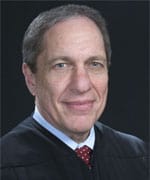 Judge Jeffrey White declared the Defense of Marriage Act (DOMA) unconstitutional about two weeks after the Ninth Circuit declared Prop 8 unconstitutional. And, if you think that timing was coincidental, there's a bridge for sale in Brooklyn.
Judge Jeffrey White declared the Defense of Marriage Act (DOMA) unconstitutional about two weeks after the Ninth Circuit declared Prop 8 unconstitutional. And, if you think that timing was coincidental, there's a bridge for sale in Brooklyn.
Golinski and Perry may be two different cases that raise different legal issues — Golinski is about federal recognition of marriages celebrated in the states; Perry is about those underlying marriages — so a progressive decision in Golinski would not necessarily have any practical effect on those same-sex couples who want to get married, other than the benefit of the expressive and cultural power of yet another ruling that says discrimination against gays is contrary to our values. But, Judge White was not only waiting for Perry out of deference to his superior court, he was also waiting for needed precedent.
Neither case required the courts to answer the otherwise pressing question of whether gay persons enjoy a fundamental right to marry, but that did not stop Judge Reinhardt and Judge White for tipping their hats. Lawyers call it a "dictum," or a statement of opinion on an issue that is beyond the issue before the court, and while it does not have the binding authority of a court's holding, or its ultimate decision, it is nevertheless helpful in building a precedential case. Dicta in both Perry and Golinski make clear that the American Foundation for Equal Rights (AFER) and Lambda Legal have been right all along: the fundamental right to marry extends to gay persons. Now, we have two more federal courts on our side.
CONTINUED, AFTER THE JUMP…
That a fundamental right to marry exists matters for the level of scrutiny: if a law impinges a fundamental right, the law can only pass constitutional muster if it is "narrowly tailored" to achieve a "compelling government interest" and is the "least restrictive means" for achieving that goal; if a law does not implicate a fundamental due process right, we apply rational basis review, which requires any conceivable legitimate government interest to be rationally related to the law. Although we have seen anti-gay discriminatory laws fail rational basis review (Amendment 2 in Romer, DOMA in Gill, for example), it is clear that if gays enjoy a fundamental right to marry, it will be difficult for bans on marriage recognition to withstand strict scrutiny.
AFER attorneys argued this point at trial and before the Ninth Circuit in Perry and much of it was picked up by Judge White in Golinski.
As far back as 1965, the Supreme Court declared in Griswold v. Connecticut that "[m]arriage is a coming together for better or for worse, hopefully enduring, and intimate to the degree of being sacred. It is an association that promotes a way of life, not causes; a harmony in living, not political faiths; a bilateral loyalty, not commercial or social projects." Griswold involved a married person's challenge to an antiquated state law that banned the use of contraceptives. The Court based its rejection of that law on a right to privacy in the "penumbras and emanations" of the Bill of Rights, but its declaration of marriage as an institution of bilateral equality so essential to our lives allowed a host of subsequent courts to find that any impingements on an individual's right to marry imlicated a fundamental right.
 Such was the case in Loving v. Virginia (1967), Zablocki v. Redhail (1978) and Turner v. Safley (1987). Loving, of course, challenged a ban on interracial marriage, while Zablocki and Turner overturned the denial of marriage of rights to deadbeat dads and prison inmates, respectively. In Loving, the Court stated that the "freedom to marry has long been recognized as one of the vital personal rights essential to the orderly pursuit of happiness by free men," suggesting that we cannot take restrictions on that "vital personal right" so lightly. In Zablocki, the Court was even more clear: the "right to marry is of fundamental importance for all individuals." And, in Turner, the Court overturned a ban on prison inmates because the "decision to marry is a fundamental right."
Such was the case in Loving v. Virginia (1967), Zablocki v. Redhail (1978) and Turner v. Safley (1987). Loving, of course, challenged a ban on interracial marriage, while Zablocki and Turner overturned the denial of marriage of rights to deadbeat dads and prison inmates, respectively. In Loving, the Court stated that the "freedom to marry has long been recognized as one of the vital personal rights essential to the orderly pursuit of happiness by free men," suggesting that we cannot take restrictions on that "vital personal right" so lightly. In Zablocki, the Court was even more clear: the "right to marry is of fundamental importance for all individuals." And, in Turner, the Court overturned a ban on prison inmates because the "decision to marry is a fundamental right."
That language is telling, especially in context. The fundamental right is the decision to marry, not a particular type of marriage nor a decision to enter a particular type of marriage. The right is broad — Loving, Zablocki, and Redhail concerned a fundamental right to marry, not a fundamental right to interracial, deadbeat dad, or inmate marriage — and refers to the individual's decision to opt for marriage. Bans on same-sex marriage recognition take away our right to decide to get married, and a comprehensive domestic partnership law that gives all the rights of marriage without the word "marriage" can never be a suitable stand-in. California's Prop 8 took away our right to decide to marry, forcing us to choose between a domestic partnership or nothing.
After all, as the Court stated in Planned Parenthood v. Casey (1992), "[o]ur law affords constitutional protection to personal decisions relating to marriage, procreation, contraception, family relationships, child rearing, and education…. These matters, involving the most intimate and personal choices a person may make in a lifetime, choices central to personal dignity and autonomy, are central to the liberty protected by the Fourteenth Amendment." That principle was extended to gay persons in Lawrence v. Texas, which recognized that criminalizing sodomy took away our rights to make personal intimate decisions. If we have that right, a law that prevents us from making the most intimate and most important decision to get married infringes our fundamental rights, as well.
This is what AFER has been arguing since the beginning of Perry v. Brown, and although the Ninth Circuit took a narrow shortcut to reject Prop 8 without deciding if there is a fundamental right to marry for gay persons, Judge White not only strongly hinted that gays do enjoy a fundamental right to marry by going through the argument above, but also relied on Judge Reinhardt's decision in Perry to seal the deal. The one barrier standing in the way of extending a fundamental right to marry to gay people is the 1972 case of Baker v. Nelson, a summary dismissal by the Supreme Court of a Minnesota case that said there is no fundamental right to gay marriage. Perry took no official position on Baker, finding it irrelevant given the court's narrow holding. But, the Court did question Baker's relevance forty years after it was decided, especially given the greater acceptance of gay rights in a post-Romer and post-Lawrence world.
Judge White in Golinski went further: Baker v. Nelson could not be a barrier to a gay person's fundamental right to marry because all the fundamental right to marry cases — from Loving to Zablocki to Turner – were not about particular kinds of marriages or particular kinds of spouses. They were about a single fundamental right to decide to marry that everyone enjoys, regardless of the character of the spouse.
Judge White has showed us the path and within the next few years, he will be joined on that path by sister courts, appellate courts, and, hopefully, the Supreme Court. All we must do is continue to make the argument in court.
***
Ari Ezra Waldman is a 2002 graduate of Harvard College and a 2005 graduate of Harvard Law School. After practicing in New York for five years and clerking at a federal appellate court in Washington, D.C., Ari is now on the faculty at California Western School of Law in San Diego, California. His research focuses on gay rights and the First Amendment. Ari will be writing weekly posts on law and various LGBT issues.
Follow Ari on Twitter at @ariezrawaldman.



